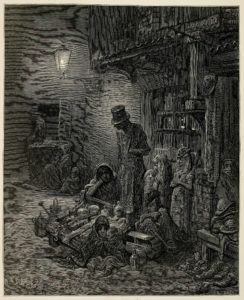Sherlock & London
Reading Sherlock Holmes, you can really see the importance of London in each of the short stories. When I think of mystery I think of the novels and shows that are located in cities like New York and even London. Cities have everything, the culture, the atmosphere, there is never a dull moment. In “The Red-Headed League”, it mentions many parts and aspects of London. He mentions the underground, tube stops and other parts around London like St. Paul that actually make you feel like you are there.
Having these crimes in a city won’t be as bizarre if it was located in the suburbs. Not a lot of crimes happen in suburbs, but in cities crime happens frequently and it makes sense that Holmes would be a detective in a city like London. Being in London you can see how busy the city actually is and how vibrant it is. Holmes’s mentions, “It is my belief, Watson, founded upon my experience, that the lowest and vilest alleys in London do not present a more dreadful record of sin than does the smiling and beautiful countryside.” It kind of feels like no matter where you are their will be crimes happening, but you won’t get that many weird cases in the countryside like you would in the city.
A lot of characters stand out in Sherlock Holmes. They all have their different personalities that make them, them. In cities you get so many different cultures and personalities that there is never a dull moment and you can see that through these short stories. But the main character is Sherlock Holmes and I can’t picture him anywhere else rather than London. He is a quirky, intelligent, motivated guy and his personality wouldn’t fit in the countryside.

